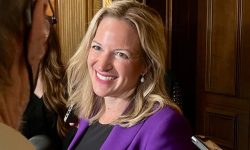Michigan closing budget gap with layoffs and cuts to roads, PFAS cleanups

State leaders passed a deal Wednesday and Thursday to cut $2.2 billion from the state’s nearly $60 billion budget to make up for a dramatic loss in revenue due to the coronavirus pandemic.
The winners: Schools and local governments, who received a boost through federal money including a one-time payment of $500 for teachers; a net increase of $175 per pupil and $150 million for local governments. Most of the money for schools is for coronavirus response.
The losers: PFAS and lead remediation ($4.8 million cut); implementing changes to Healthy Michigan ($2.5 million cut); roads and bridges ($13 million) and the state’s workforce. Most of the savings came from temporary layoffs and hiring freezes.
- Michigan coronavirus unemployment, map, curve, COVID-19 updates
- Dashboard: Michigan coronavirus testing numbers, trends, COVID-19 data
“Every budget is a statement of priorities. In the face of unprecedented and unforeseen challenges within 2020, the budget agreement before you reflects our shared commitment to schools, local government and everyone affected by COVID-19,” said Sen. Jim Stamas, R-Midland, chair of the Senate Appropriations Committee, on the Senate floor Wednesday.
More tough decisions lie ahead: This deal balances the state budget through the end of September, when the next fiscal year begins and the state faces another $3 billion budget shortfall. The new budget was supposed to be completed by July, but it was postponed due to the virus.
The shortfalls are because tax collection fell dramatically as the state’s economy contracted amid the pandemic and more than 1 million state residents were left jobless.
The budget agreement uses up the lion’s share of the pandemic relief money sent to Michigan from the federal government through the CARES Act. After this budget deal, only $94 million are left from the $3 billion received. It must be spent by the end of the year.
The bipartisan budget deal was negotiated by the administration of Gov. Gretchen Whitmer, a Democrat, and GOP legislative leaders, including Stamas and House Appropriations Chairman Shane Hernandez of Port Huron.
Whitmer’s budget director, Chris Kolb, said the deal protects “public education, health care, our local communities and critical services our residents depend on."
Among the highlights:
- Schools will get an extra $256 million in funding to help prepare for the upcoming school year, and teachers willing to remain on the job will qualify for a collective $53 million in hazard pay.
- An executive order from Whitmer cuts approximately $620 million in state spending but utilizes $475 million in federal funding for state police and the department of corrections, resulting in a cut of about $145 million.
- The Department of Health and Human Services, the state's largest department, will see its current-year budget cut by $36 million. About half that savings are from hiring freezes and temporary layoffs.
The Whitmer administration began temporary layoffs and furloughs for state employees in April. It appears the budget deal incorporates those savings and will not require additional layoffs at this time.
Budget officials in May lowered revenue projections for the current fiscal year by $3.2 billion. But enhanced Medicaid payments from the federal government softened some of that blow, and the state had $788 million in leftover funds to help close the gap to $2.2 billion.
Under the deal, the state will spend $350 million from its nearly $1.2 billion Budget Stabilization Fund, otherwise known as the rainy day fund, leaving it with a balance of $836 million.
That’s one reason why Sen. Jeff Irwin, D-Ann Arbor, was the only senator to vote against the package. The deal passed unanimously in the House.
“It’s betting on the fact that the fed government is going to come up with more relief and if they do, it might make this compromise a little more reasonable in my mind,” Irwin told Sinclair Broadcast Group Wednesday. “But until Congress acts, I think it’s a mistake for us to burn up all our dry tinder when we don’t know what Congress is going to do.”
The Whitmer administration continues to urge the federal government to provide additional aid to states and local governments. With key provisions of the CARES act soon to expire, including $600 a week in Pandemic Unemployment Assistance for the jobless, Congress is currently debating parameters of another relief package.
The budget deal represents a rare instance of bipartisan cooperation this year, which has been marked by feuds over Whitmer's executive power and her handling of the coronavirus pandemic.
Michigan has to balance its budget for fiscal year 2021 by the end of September in order to avoid a government shutdown, which nearly occurred last year during a tense feud between GOP leadership and Whitmer, who used a record number of line-item vetoes and transfers to reshape a budget crafted by the Legislature.
And that was before the global pandemic.
"We still have a lot of challenges moving forward," said Rep. Jon Hoadley, D-Kalamazoo, minority vice chair of the House Appropriations Committee. “We have a whole set of challenges ahead for us next fiscal year, and we're going to need some help to get that done, but hopefully with the spirit of bipartisanship, we can start on the right foot."
Editor's note: This story was changed at 8:05 p.m. July 22 to update the budget process as it worked its way through the Legislature.
See what new members are saying about why they donated to Bridge Michigan:
- “In order for this information to be accurate and unbiased it must be underwritten by its readers, not by special interests.” - Larry S.
- “Not many other media sources report on the topics Bridge does.” - Susan B.
- “Your journalism is outstanding and rare these days.” - Mark S.
If you want to ensure the future of nonpartisan, nonprofit Michigan journalism, please become a member today. You, too, will be asked why you donated and maybe we'll feature your quote next time!




